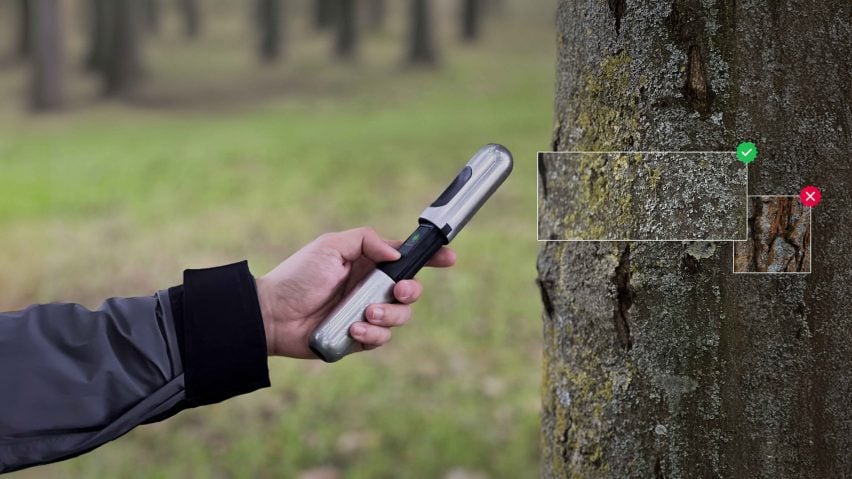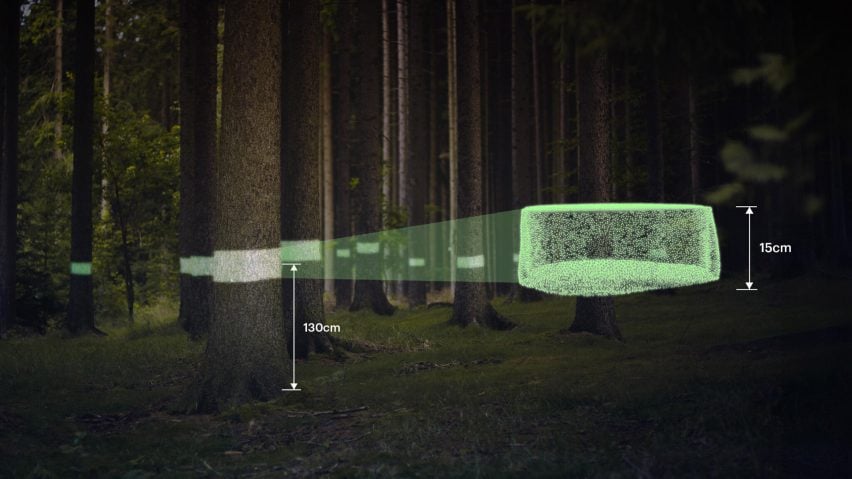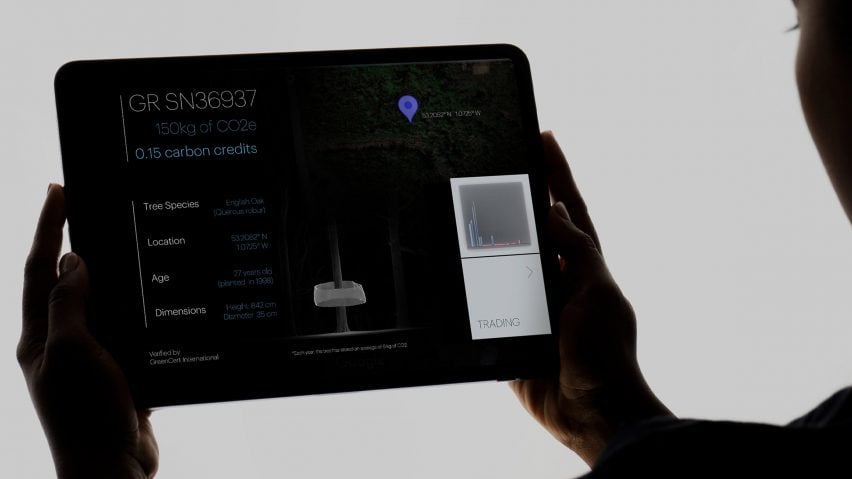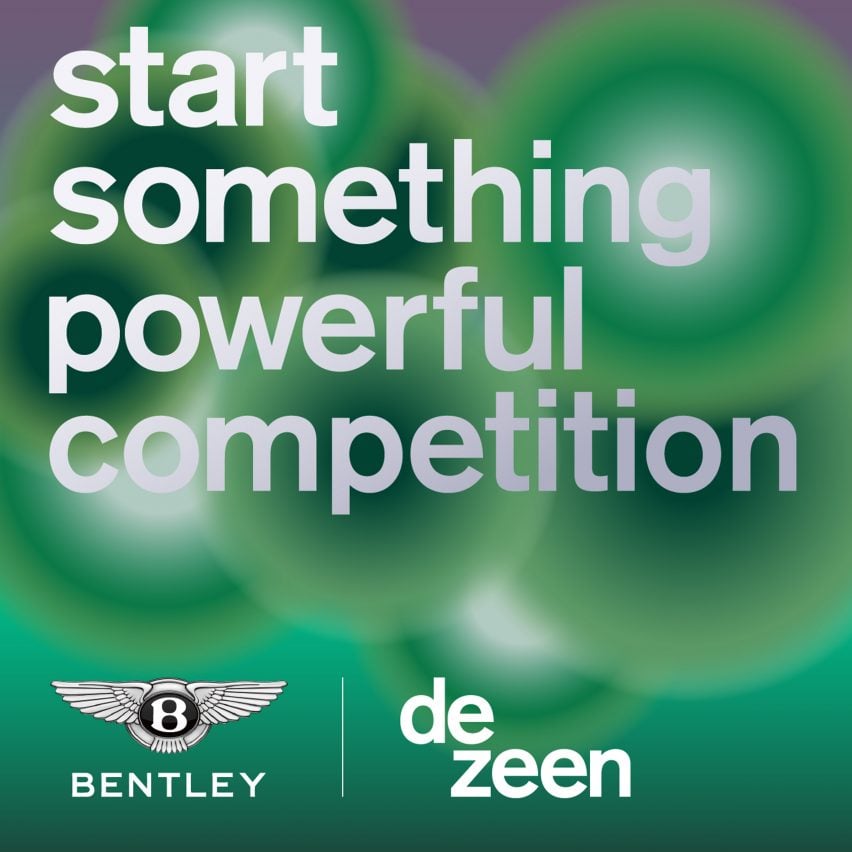Hanju Seo wins Start Something Powerful Competition with tree identification system
Hanju Seo has won Dezeen and Bentley's Start Something Powerful Competition with a concept that helps identify individual trees by their bark, enabling small forest owners to participate more effectively in carbon offset programmes.
The global design competition invited architects and designers to envisage innovative concepts that could have a transformative effect on people's lives over the next 100 years.
Through the design contest, Dezeen and Bentley sought to discover prototypes that could serve as a blueprint for future living, anticipating the needs, technologies and lifestyle trends.
South Korean designer Seo proposed a concept called EarthCode, a system to make tree identification easier and more affordable, particularly for verifying carbon storage in forests.
The concept draws on centuries-old methods of tree identification, where forest managers would identify trees by their bark patterns.
EarthCode modernises this approach by integrating artificial intelligence (AI) with a handheld scanner, which would create unique "Bark-Codes" for each tree.
This system would help ensure that carbon credits are based on accurate, tamper-proof data, enhancing their credibility and fostering better environmental stewardship.

The goal of EarthCode is to empower small forest owners, especially those managing areas under 50 hectares, to participate in carbon offset markets.
These markets reward landowners for capturing carbon dioxide in their forests, yet only a small percentage of family forest owners (FFOs) currently participate, despite managing nearly 40 per cent of forest land in the US.
By simplifying the verification process and reducing costs, EarthCode would enable these owners to engage in carbon offset programmes more easily.
The proposal was selected by a panel of judges comprising designers and journalists from Bentley and Dezeen.

"EarthCode helps to bypass the bureaucratic barrier that is currently preventing family forest owners from embracing the carbon offsets market," Dezeen's editorial director Max Fraser said.
"The project caught our attention due to the potential global reach of this small and smart device. Easily dispatched worldwide, the device allows owners to log their trees by scanning the bark – the tree's unique equivalent to a finger-print."
"EarthCode is a great example of how advanced technology can be beautifully integrated into a refined, compact design," said Chris Cooke, head of design collaborations at Bentley.
"It aligns seamlessly with Bentley's philosophy of innovation and craftsmanship, offering a smart, sustainable solution that feels intuitive and sophisticated."
Read more about the proposal below:
EarthCode by Hanju Seo
London, UK
First place
"EarthCode is a pioneering system designed to democratise the carbon offset market by allowing family forest owners (FFOs) to participate more effectively. Currently, only 0.1 per cent of FFOs are engaged in carbon offset markets, despite managing nearly 40 per cent of forest land in the US.
"EarthCode leverages a handheld 2D LiDAR scanner to create unique, tamper-proof Bark-Codes for each tree, transforming how carbon credits are verified.
"The system not only utilises cutting-edge technology but also honours traditional methods of tree identification, creating a bridge between heritage and modern innovation.
"By integrating small forest owners into the carbon offset market, EarthCode could unlock a significant portion of a currently untapped market, potentially generating billions in new revenue streams for these owners. With over 200 million family forest owners globally, representing 1.2 billion hectares of forest, the economic potential is vast.

"Studies suggest that with the right interventions, family forests could capture an additional 267 million metric tons of CO2, equivalent to taking 57 million cars off the road annually.
"This inclusion could drive better forest management practices, fostering a more equitable and effective carbon offset market while making a substantial contribution to global climate action efforts.
"EarthCode dramatically enhances the credibility and sustainability of carbon credits by ensuring that they are based on verifiable, tamper-proof data. Traditional methods like RFID nails are invasive, costly and environmentally damaging, often made from ABS plastic, which contributes to waste and pollution.
"In contrast, EarthCode's approach, which uses each tree's unique bark patterns as a natural identifier, avoids these issues entirely. The system's reliance on low-power LiDAR technology also minimises its environmental footprint, making it a far more sustainable alternative to existing verification methods.
"EarthCode seeks to redefine the carbon offset market by blending advanced technology with a deep respect for traditional forest management practices."

Dezeen and Bentley's Start Something Powerful Competition is a global contest that called for pioneering proposals that could have a powerful impact on how people live over the next 100 years.
The contest received entries from more than 34 countries around the world.
A selection of eight innovative proposals were shortlisted by the judges, with the shortlist published on Dezeen earlier this month.
The judges ultimately selected EarthCode by Seo as the overall winner of the competition.
Seo has received the top prize of £15,000 for his winning proposal, while Rehan Petit received £10,000 for his Bio-Fender concept and Matthew Pratt received £5,000 for Shadow of the Oases.
Find out more about the Start Something Powerful Competition ›
Partnership content
The Start Something Powerful Competition is a partnership between Dezeen and Bentley. Find out more about Dezeen partnership content here.